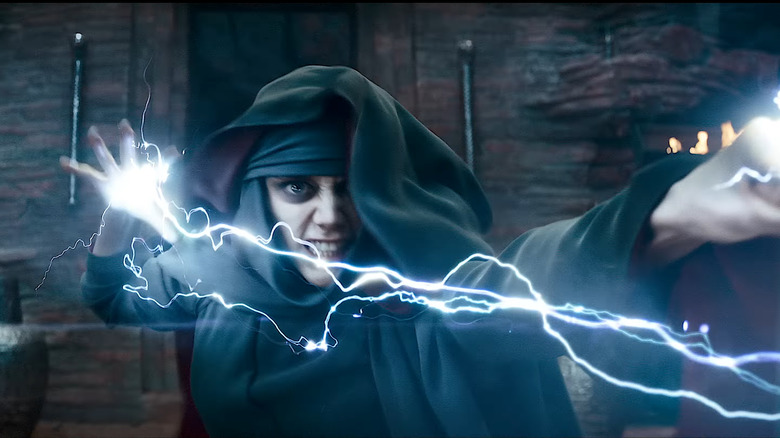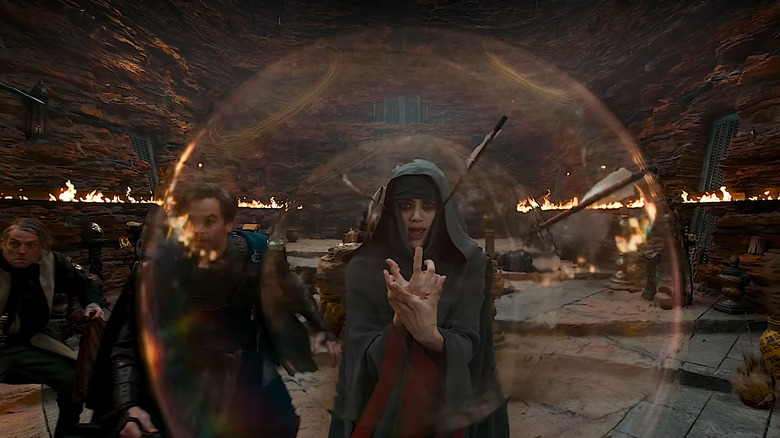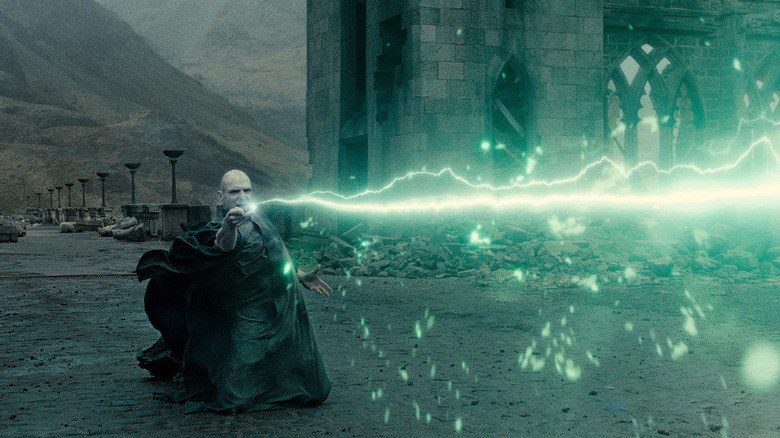D&D: Honor Among Thieves' Magic System Puts Other Fantasy Franchises To Shame
Contains spoilers for "Dungeons & Dragons: Honor Among Thieves"
"Dungeons & Dragons: Honor Among Thieves" misty stepped its way into theaters this week, with a whole lot of magic accompanying it. We're not talking movie magic, although early reviews suggest it nailed that too. No, we mean literal — well, fantasy — magic, as the ragtag group of misfits constantly ask for their resident spellcaster, Simon (Justice Smith), to fix all their problems with a simple wave of his hands. He constantly reiterates that magic doesn't work like that, but it doesn't hurt to try.
In fact, when magic does work in "Honor Among Thieves," it works well, putting other fantasy franchises' spellcasting to shame. The movie rips the magic system straight from the pages of the "Player's Handbook," which teaches "D&D" newcomers how spells work in the world. The most important part, which most other fantasy franchises don't have, is the limitations. Regardless of how over-the-top the action gets in "Honor Among Thieves," its magic system is rooted in realism, assuming that spellcasting was a part of the real world.
Dungeons & Dragons brings a more 'realistic' magic system
"Dungeons & Dragons: Honor Among Thieves" introduces the audience to the magic system of "D&D" primarily through Simon, the group's aspiring sorcerer. Upon Edgin (Chris Pine) and Holga (Michelle Rodriguez) reuniting with Simon, the spellcaster's spell goes awry, with the villagers noticing he's been stealing from them. A brawl ensues, and we see how Simon's magic isn't a guaranteed success. In the game "D&D," many sorcerers gain power through wild magic, meaning that an untamed random magical effect happens whenever they cast a spell, which the movie shows when Simon accidentally reverses gravity.
Another way "Honor Among Thieves" boasts a more realistic magic system is through vocal components. In "D&D," most spells require the caster to utter a phrase, and if they can't speak for whatever reason, they won't be able to cast it. Fans see this in the movie when, during the same brawl, a villager covers Simon's mouth, preventing him from casting a spell.
However, the most important aspect of this magic system is concentration. "D&D" boasts a wide array of spells that require the caster to maintain concentration for it to have any effect. This prevents players from spamming multiple incantations and adds another level of realism to the magic system. "Honor Among Thieves" incorporates this really well into the movie. The most obvious example is when Simon's foot gets stuck as they're trying to find the Neverwinter vault, leading to his concentration breaking and his illusion of Edgin falling apart in the most hilarious way possible.
Other magic systems don't compare
Although "D&D" has had nearly 50 years to perfect its magic system, "Dungeons & Dragons: Honor Among Thieves" proves that it sets itself apart from other fantasy franchises. Take "Harry Potter," for instance, where wizards take the traditional route to spellcasting, using wands to cast fairly ordinary spells. In the movies, most battles devolve into the same situation: enemies shoot elongated lightning at one another, often non-verbally, making for a stalemate until one wizard overpowers another. It's pretty dull and repetitive and doesn't make for very compelling magic-centered battles.
On the other hand, "Honor Among Thieves" showcases the different magic in the "D&D" universe, with the final fight against Sofina (Daisy Head) featuring more varied spells than any "Harry Potter" film, which by the end of the franchise seemed to only rotate through the same handful of spells. "Honor Among Thieves" depicts minor illusions, fireballs, reanimating statues, and water manipulation, to name a few.
When comparing "Honor Among Thieves" to the magic systems in "Game of Thrones" and "Lord of the Rings," "D&D" wins again. Both franchises use spells in a much more serious tone with unclear limitations (as felled heroes are seemingly easily resurrected by magic), and spellcraft isn't as frequently employed as in "D&D." In the tabletop RPG, magic is a staple piece of the world, with some being born with natural abilities while others learn how to utilize the arcane. Overall, the magic displayed in "Honor Among Thieves" makes for a much more engaging, thoroughly delightful viewing experience for fantasy fans, while remaining faithful to the established rules of the game for "D&D" devotees.


